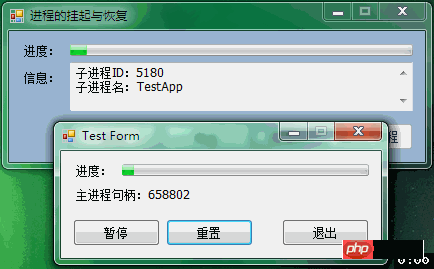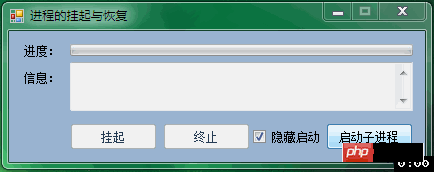这篇文章主要介绍了C#中进程的挂起与恢复操作方法,非常不错,具有参考借鉴价值,需要的朋友可以参考下
1. 源起:
仍然是模块化编程所引发的需求。产品经理难伺候,女产品经理更甚之~:p
纯属戏谑,技术方案与产品经理无关,芋头莫怪!
VCU10项目重构,要求各功能模块以独立进程方式实现,比如:音视频转换模块,若以独立进程方式实现,如何控制其暂停、继续等功能呢?
线程可以Suspend、Resume,c#内置的Process没有此类方法,咋整?
山穷水尽疑无路,柳暗花明又一村。情到浓时清转薄,此情可待成追忆!
前篇描述了进程间数据传递方法,此篇亦以示例演示其间控制与数据交互方法。
2、未公开的API函数:NtSuspendProcess、NtResumeProcess
此类函数在MSDN中找不到。
思其原因,概因它们介于Windows API和 内核API之间,威力不容小觑。怕二八耙子程序员滥用而引发事端,因此密藏。
其实还有个NtTerminateProcess,因Process有Kill方法,因此可不用。
但再隐秘的东西,只要有价值,都会被人给翻出来,好酒不怕巷子深么!
好,基于其,设计一个进程管理类,实现模块化编程之进程间控制这个需求。
3、ProcessMgr
直上代码吧,封装一个进程管理单元:
public static class ProcessMgr
{
/// <summary>
/// The process-specific access rights.
/// </summary>
[Flags]
public enum ProcessAccess : uint
{
/// <summary>
/// Required to terminate a process using TerminateProcess.
/// </summary>
Terminate = 0x1,
/// <summary>
/// Required to create a thread.
/// </summary>
CreateThread = 0x2,
/// <summary>
/// Undocumented.
/// </summary>
SetSessionId = 0x4,
/// <summary>
/// Required to perform an operation on the address space of a process (see VirtualProtectEx and WriteProcessMemory).
/// </summary>
VmOperation = 0x8,
/// <summary>
/// Required to read memory in a process using ReadProcessMemory.
/// </summary>
VmRead = 0x10,
/// <summary>
/// Required to write to memory in a process using WriteProcessMemory.
/// </summary>
VmWrite = 0x20,
/// <summary>
/// Required to duplicate a handle using DuplicateHandle.
/// </summary>
DupHandle = 0x40,
/// <summary>
/// Required to create a process.
/// </summary>
CreateProcess = 0x80,
/// <summary>
/// Required to set memory limits using SetProcessWorkingSetSize.
/// </summary>
SetQuota = 0x100,
/// <summary>
/// Required to set certain information about a process, such as its priority class (see SetPriorityClass).
/// </summary>
SetInformation = 0x200,
/// <summary>
/// Required to retrieve certain information about a process, such as its token, exit code, and
priority class (see OpenProcessToken, GetExitCodeProcess, GetPriorityClass, and IsProcessInJob).
/// </summary>
QueryInformation = 0x400,
/// <summary>
/// Undocumented.
/// </summary>
SetPort = 0x800,
/// <summary>
/// Required to suspend or resume a process.
/// </summary>
SuspendResume = 0x800,
/// <summary>
/// Required to retrieve certain information about a process (see QueryFullProcessImageName).
A handle that has the PROCESS_QUERY_INFORMATION access right is automatically granted PROCESS_QUERY_LIMITED_INFORMATION.
/// </summary>
QueryLimitedInformation = 0x1000,
/// <summary>
/// Required to wait for the process to terminate using the wait functions.
/// </summary>
Synchronize = 0x100000
}
[DllImport("ntdll.dll")]
private static extern uint NtResumeProcess([In] IntPtr processHandle);
[DllImport("ntdll.dll")]
private static extern uint NtSuspendProcess([In] IntPtr processHandle);
[DllImport("kernel32.dll", SetLastError = true)]
private static extern IntPtr OpenProcess(
ProcessAccess desiredAccess,
bool inheritHandle,
int processId);
[DllImport("kernel32.dll", SetLastError = true)]
[return: MarshalAs(UnmanagedType.Bool)]
private static extern bool CloseHandle([In] IntPtr handle);
public static void SuspendProcess(int processId)
{
IntPtr hProc = IntPtr.Zero;
try
{
// Gets the handle to the Process
hProc = OpenProcess(ProcessAccess.SuspendResume, false, processId);
if (hProc != IntPtr.Zero)
NtSuspendProcess(hProc);
}
finally
{
// Don't forget to close handle you created.
if (hProc != IntPtr.Zero)
CloseHandle(hProc);
}
}
public static void ResumeProcess(int processId)
{
IntPtr hProc = IntPtr.Zero;
try
{
// Gets the handle to the Process
hProc = OpenProcess(ProcessAccess.SuspendResume, false, processId);
if (hProc != IntPtr.Zero)
NtResumeProcess(hProc);
}
finally
{
// Don't forget to close handle you created.
if (hProc != IntPtr.Zero)
CloseHandle(hProc);
}
}
}4、进程控制
我权且主进程为宿主,它通过Process类调用子进程,得其ID,以此为用。其调用代码为:
private void RunTestProcess(bool hidden = false)
{
string appPath = Path.GetDirectoryName(Application.ExecutablePath);
string testAppPath = Path.Combine(appPath, "TestApp.exe");
var pi = new ProcessStartInfo();
pi.FileName = testAppPath;
pi.Arguments = this.Handle.ToString();
pi.WindowStyle = hidden ? ProcessWindowStyle.Hidden : ProcessWindowStyle.Normal;
this.childProcess = Process.Start(pi);
txtInfo.Text = string.Format("子进程ID:{0}\r\n子进程名:{1}", childProcess.Id, childProcess.ProcessName);
...
}控制代码为:
private void btnWork_Click(object sender, EventArgs e)
{
if (this.childProcess == null || this.childProcess.HasExited)
return;
if ((int)btnWork.Tag == 0)
{
btnWork.Tag = 1;
btnWork.Text = "恢复";
ProcessMgr.SuspendProcess(this.childProcess.Id);
}
else
{
btnWork.Tag = 0;
btnWork.Text = "挂起";
ProcessMgr.ResumeProcess(this.childProcess.Id);
}
}子进程以一定时器模拟其工作,向主进程抛进度消息:
private void timer_Tick(object sender, EventArgs e)
{
if (progressBar.Value < progressBar.Maximum)
progressBar.Value += 1;
else
progressBar.Value = 0;
if (this.hostHandle != IntPtr.Zero)
SendMessage(this.hostHandle, WM_PROGRESS, 0, progressBar.Value);
}代码量就这么的少,简单吧……
5、效果图:
为示例,做了两个图,其一为显示子进程,其二为隐藏子进程。

实际项目调用独立进程模块,是以隐藏方式调用的,以宿主展示其处理进度,如此图:

后记:
扩展思路,一些优秀的开源工具,如youtube_dl、ffmpeg等,都以独立进程方式存在,且可通过CMD管理通信。
以此进程控制原理,可以基于这些开源工具,做出相当不错的GUI工具出来。毕竟相对于强大的命令行,人们还是以简单操作为方便。
以上是C#中进程的挂起与恢复的代码实例分析(图)的详细内容。更多信息请关注PHP中文网其他相关文章!




